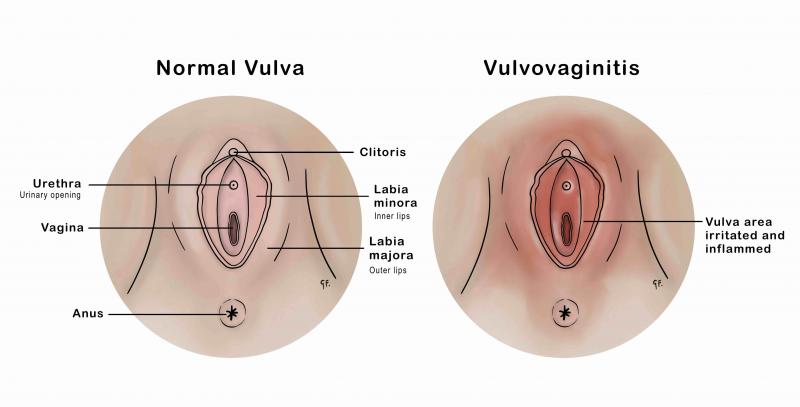Vulvovaginitis In Children
Vulvovaginitis In Children
Vulvovaginitis causes itch and irritation around the vagina and vulva. It is common in tamariki.
Key points about vulvovaginitis in children
- vulvovaginitis is irritation of the vagina and vulva (outer female genitals)
- mild vulvovaginitis is common in tamariki
- it can cause itch and discomfort around the vulva
- in most mild cases, no treatment or tests are needed
- vulvovaginitis tends to occur less often after puberty
What is the vulva?
The vulva includes all the outer genitals in females including the vagina and urethra (where wee drains from).
What is vulvovaginitis?
Vulvovaginitis is irritation of the vagina and vulva. Mild vulvovaginitis is common in tamariki. In most cases, it is not a serious problem. Some tamariki may get vulvovaginitis more than once. Once puberty has started, vulvovaginitis usually doesn’t happen as often.

What are the symptoms of vulvovaginitis?
Symptoms of vulvovaginitis include:
- itch around the genitals
- redness of the skin around the vulva
- discomfort when passing urine
- discharge from the vagina
- sometimes, bleeding from the vagina
What causes vulvovaginitis in children?
The skin over the vulva (outer genitals) in young tamariki is thin and can be easily irritated. If there is moisture and dampness around the vulva, it can cause vulvovaginitis. Tight clothing or not changing clothes soon after exercise can lead to the area being damp.
Other causes include irritants like soap and bubble baths. Thrush or fungal infections are uncommon in tamariki who haven’t been through puberty yet. Some tamariki may develop vulvovaginitis if they are infected with threadwords.
See the KidsHealth page on threadworms to learn more
How can I prevent my child from developing vulvovaginitis?
Hygiene
Simple skin care can help to prevent your child from developing vulvovaginitis. Treat the skin of the vulval area very gently, do not over-wash the area. Encourage your child to wipe from front to back.
To stop the skin from becoming irritated, avoid the following things:
- bubble baths
- scented soaps or creams
- coloured, printer or scented toilet paper
- nappy wipes
- talcum powder
Clothing and laundry
Some washing products and tight clothing can irritate the vulva. Things that can help prevent vulvovaginitis include:
- cotton underwear
- avoid wearing tights and leggings
- avoid laundry rinse aids in the washing machine
- ensure laundry detergent is rinsed well from your child's underwear
Physical activity
If your child has played sports or been active, change them out of their sports clothes as soon as possible after exercise. Remove swimming costumes soon after swimming. Where possible, avoid lengthy activities that put direct pressure on the vulva, such as bike and horse riding.
See the KidsHealth page on vulval skin care for more information
How do you manage mild vulvovaginitis in children?
Vinegar or baking soda baths
If your child does have some irritation around the vulva, you can try a vinegar or baking soda bath. Vinegar baths can help to prevent mild infections in the vulva and may relieve itch. Add ½ a cup of white vinegar to a shallow bath. Allow your child to sit and soak in it for up to 15 minutes. Depending on their symptoms, your child can have a vinegar bath anywhere from twice a day to once a week.
Another option is adding baking soda to the bath. Add 1-2 tablespoons of baking soda into a shallow bath. After bathing, put on a barrier cream.
Cool compress
You can make a cool compress with paper towels and water and apply it to the vulva to relieve itch. Place it in the underwear like a sanitary pad. This can be particularly helpful after exercise.
Avoid scratching
Encourage your child to avoid scratching the area. Scratching can cause the itch to worsen, and the area can become more irritated after scratching.
When should I take my child to the doctor?
If your child has vulval itch and irritation that has not settled with simple measures, take them to the doctor. Most cases do not need treatment. However, if it happens frequently or bothers your child, your doctor may prescribe some treatment. Your doctor may prescribe a fragrance-free barrier cream such as a zinc cream. This can be applied throughout the day and can relieve itch and dryness.
In more severe cases of vulvovaginitis, your doctor may refer your child to a paediatrician (child health specialist) for further management.
If your child complains of burning or pain when they wee, the doctor may also want to check they don’t have a urine infection.
This page last reviewed 30 August 2023.
Do you have any feedback for KidsHealth?
If you have any feedback about the KidsHealth website, or have a suggestion for new content, please get in touch with us.
Email us now